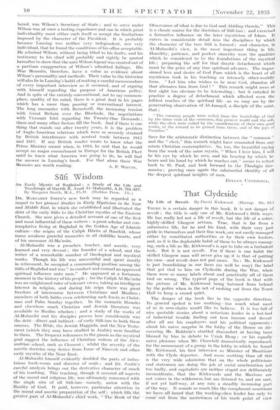safi Wisdom
An Early Mystic of Baghdad : a Study of the Life and ' Teachings of Harlth B. Asad Al-Muhasibi, A.D. 781-857. By Margaret Smith, M.A., Ph.D. (Sheldon Press. 15s.)
MARGARET SMITH'S new book may be regarded as a sequel to her pioneer Studies fn Early Mysticism in the Near and Middle East, in which she established and illustrated the debt of the early Sufis to the Christian mystics of the Eastern Church. She now gives a detailed account of one of the first and most influential of these writers : a great scholar and con- templative living at Baghdad in the Golden Age of Islamic Culture—the reigns of the Caliph Hurfin al Raschid, whose flame awakens grateful memories in all childlike hearts, and of his successor Al-Ma'mfin.
Al-Muhasibi was a preacher, teacher, and ascetic, very learned and very devout ; the founder of a school, and the writer of a remarkable number of theological and mystical Works. Though his life was uneventful and spent mostly in retirement, he occupied a commanding position among the Sufis of Baghdad and was " in conduct and counsel an approved spiritual influence unto men." He appeared at a fortunate moment in the history of his people ; for the Caliph Al-Ma'mfin Was an enlightened ruler of tolerant views, taking an intelligent interest in religion, and during his reign there was great freedom of intercourse between Christians and Muslims ; Members of both faiths even celebrating such feasts as Christ- , mas and Palm Sunday together. In the monastic libraries
and elsewhere much Christian and Jewish literature was available to Muslim scholars ; and a study of the winks of Al-Muhasibi and his disciples proves how considerable was the debt—direct and indirect—of early Sfifi-ism to both these Sources. The Bible, the Jewish Haggada, and the New Testa- ment (which they may have studied in Arabic) were familiar to them. The frequent references to the gnosis as the mystical goal suggest the influence of Christian writers of the AleX- andrian school, such as Clement ; whilst the severity of the ascetic doctrine may derive from Isaac of Nineveh and other early mystics of the Near East.
Al-Muhasibi himself evidently doubled the parts of indus- trious book-worm and director of souls ; and Dr. Smith's Careful analysis brings out the derivative character of .much of his teaching. This teaching, though it covered all aspects of the moral and religious life, was ultimately concerned with the single aim of all Sufi-ism—namely, union with the ;Reality of God. It paid, however, particular attention to the moral and ascetic preparation of the self ; which fills' the
part of Al-Muhasibi's chief work, "The Book of the Observance of what is due to God and Abiding therein." This is a classic source for the doctrines of Sufi-isin ; and exercised a formative influence on the later mysticism of Islam. It enters in considerable detail into the disciplines by which the character of the true Safi is formed ; and character, in Al-Muhasibi's view, is the most 'important thing in life. Humility, patience, and perfect sincerity were the qualities which he considered to be the foundations of the mystical life ; preparing the self for that drastic detachment which must be the price of any true spiritual advance. The impas- sioned love and desire of God Pure which is the heart of all mysticism took in his teaching an intensely other-worldly form. " Let him who wishes to be near God, abandon all that alienates him from God ! " This remark might seem at first sight too obvious to be interesting ; but it entailed in practice a degree of detachment which affected even the loftiest -reaches of the spiritual life—as we may see by the penetrating observation of Al-Junayd, a disciple of the saint, that :
" The common people were veiled from the knowledge of God by the three veils of the creatures, this present world and the self, while the elect were veiled by the consideration of their own good works, of the reward to be gained from them, and of the joys of Paradise."
Save for the aristocratic distinction between the " common " and the " elect," this remark might have emanated from any astute Christian contemplative. So, too, the beautiful saying from the work of the same mystic, "-When I love him, I will
be his eye „by which he secs, and his hearing by which he hears and his hand by which he reaches out," seems to reflect back to St. Paul, and look forward to the Theologia Ger- manica ; proving once again the substantial identity of all the deepest spiritual insights of men.
EVELYN UNDERHILL!






























































































 Previous page
Previous page